八下新目标英语unit4教学案
2020年春人教新目标英语八年级下册Unit4第一课时教案
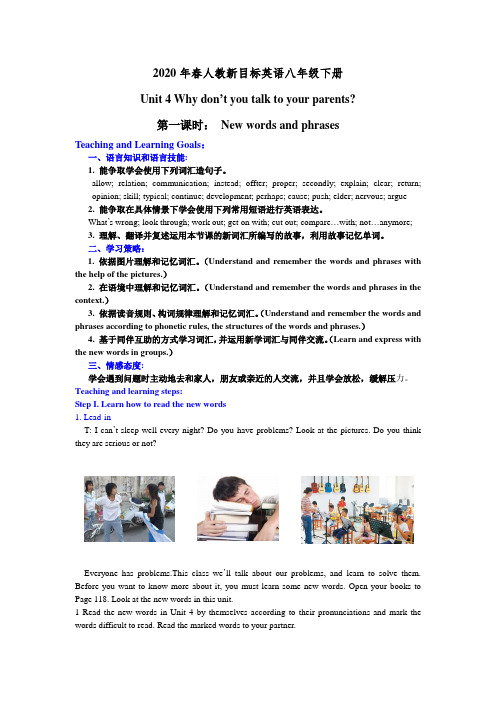
_____⑶worries about things at home,school orworkc.找出两者之间的不同点
_____⑷usual or commond.体育锻炼和技巧练习
_____⑸try to be the first to finish sthe.寻常的或不同的
而在本节课中我运用图式理论呈现词汇这一呈现方式让学生不断地丰富与完善已有的图式并通过已有图式更好地理解与记忆新词汇而且提高学生对词汇学习的趣味性并在此基础上增强词汇教学效果2
2020年春人教新目标英语八年级下册
Unit4Why don’t you talk to your parents?
第一课时:New wordsand phrases
Step II. Learn how to memorize the new words and phrases
1. Remember the words and phrases according to the pictures.
communicatev.沟通
They arecommunicatingintheoffice.
1 Read the new words in Unit 4by themselves according to their pronunciations and mark the words difficult to read. Read the marked words to your partner.
三、情感态度:
学会遇到问题时主动地去和家人,朋友或亲近的人交流,并且学会放松,缓解压力。
人版新目标八年级英语(下册)全册电子版教学案
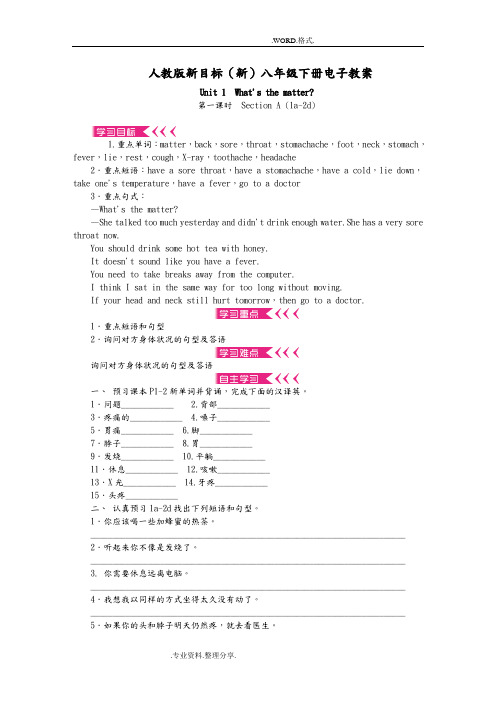
人教版新目标(新)八年级下册电子教案Unit 1What's the matter?第一课时Section A (1a2d)1.重点单词:matter,back,sore,throat,stomachache,foot,neck,stomach,fever,lie,rest,cough,Xray,toothache,headache2.重点短语:have a sore throat,have a stomachache,have a cold,lie down,take one's temperature,have a fever,go to a doctor3.重点句式:—What's the matter?—She talked too much yesterday and didn't drink enough water.She has a very sore throat now.You should drink some hot tea with honey.It doesn't sound like you have a fever.You need to take breaks away from the computer.I think I sat in the same way for too long without moving.If your head and neck still hurt tomorrow,then go to a doctor.1.重点短语和句型2.询问对方身体状况的句型及答语询问对方身体状况的句型及答语一、预习课本P12新单词并背诵,完成下面的汉译英。
1.问题____________ 2.背部____________3.疼痛的____________ 4.嗓子____________5.胃痛____________ 6.脚____________7.脖子____________ 8.胃____________9.发烧____________ 10.平躺____________11.休息____________ 12.咳嗽____________13.X光____________ 14.牙疼____________15.头疼____________二、认真预习1a2d找出下列短语和句型。
新目标英语八年级下unit4 Reading教学设计及课后总结反思
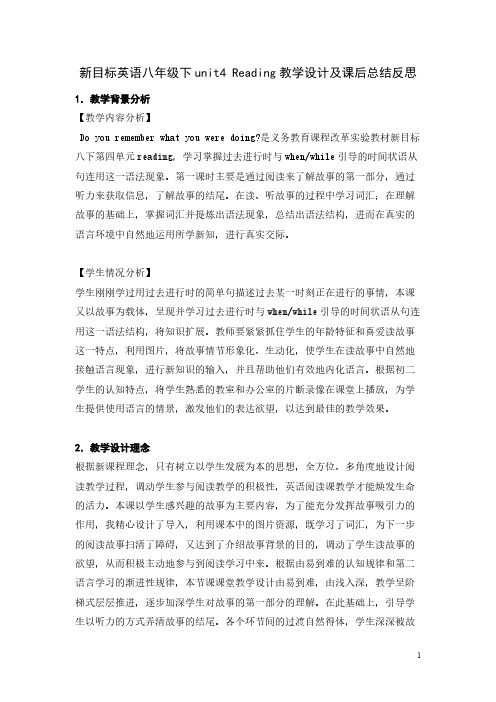
1.教学背景分析 【教学内容分析】 Do you remember what you were doing?是义务教育课程改革实验教材新目标 八下第四单元 reading,学习掌握过去进行时与 when/while 引导的时间状语从 句连用这一语法现象。第一课时主要是通过阅读来了解故事的第一部分,通过 听力来获取信息,了解故事的结尾。在读、听故事的过程中学习词汇;在理解 故事的基础上,掌握词汇并提炼出语法现象,总结出语法结构,进而在真实的 语言环境中自然地运用所学新知,进行真实交际。
学生活动看图Biblioteka 回答问题。了解故事背景,在语境
3
step 3 reading
stop the taxi. 2. ask ss to read the words after the teacher. 3. check the reading of the new words.
4. get ss to remember the new words in one minute. 5. check the words.
2.教学设计理念 根据新课程理念,只有树立以学生发展为本的思想,全方位、多角度地设计阅 读教学过程,调动学生参与阅读教学的积极性,英语阅读课教学才能焕发生命 的活力。本课以学生感兴趣的故事为主要内容,为了能充分发挥故事吸引力的 作用,我精心设计了导入,利用课本中的图片资源,既学习了词汇,为下一步 的阅读故事扫清了障碍,又达到了介绍故事背景的目的,调动了学生读故事的 欲望,从而积极主动地参与到阅读学习中来。根据由易到难的认知规律和第二 语言学习的渐进性规律,本节课课堂教学设计由易到难,由浅入深,教学呈阶 梯式层层推进,逐步加深学生对故事的第一部分的理解。在此基础上,引导学 生以听力的方式弄清故事的结尾。各个环节间的过渡自然得体,学生深深被故
初中英语人教新目标版八年级下册 Unit 4 Section B 教案

Unit 4Why don’t you talk to your parents?1. Talk about the problems.2. Learn the new language points.1. The differences of“cut up , cut off, cut out”.2. The usage of“compare. . . with. . . ”.现如今父母与青春期孩子们之间的矛盾越来越多, 有的孩子经常对父母发火, 甚至几天不说话。
请以“How to get along well with parents”为题, 阐述父母与孩子间产生矛盾的原因, 以及改善关系的解决措施。
词数: 100词左右。
要点可以包括:1)产生矛盾原因: 父母过分关注分数; . . .2)改善关系的措施: 多交流; . . .How to get along well with parentsNowadays, more and more teenagers can’t get along well with their parents. They often get mad at their parents and some of them even don’t talk with their parents for several days. Why does the relationship between teenagers and parents get so bad? Here are some reasons.First, much attention is paid to teenagers’ grades in exams by parents. They only want to see their kids studying all the time without having a rest or having their own time. Second, both teenagers andparents don’t spend much time in communicating with each other. Parents are always busy with their work. They even don’t understand each other.How to make the relationship better? The followings are the ways to solve this problem. First of all, parents are supposed to spend more time with their f amily. It’s important to take some time to communicate if there are some problems. Besides, both parents and teenagers should find a right way to express their love and talk about their own thoughts to each other. All the problems can be solved by love and understanding.I hope the relationship between parents and teenagers can be good at any time. If both of them would like to spend time and efforts in how to solve the problems between them, they will have a happy and wonderful life together.本课时从一开始即给了学生明确的教学任务, 达到开门见山的效果, 让学生学习的目标性更强, 小组练习的方式也能加强学生对知识点的巩固。
新目标人教版八年级下册英语第四单元说课稿教育文档

新目标人教版八年级下册英语第四单元说课稿一、教材教材地位与分析,我今天的内容是:八年下Unit4Whydon’tyoutalktoyourparents?SectionB〔1a-1e〕局部,人民教育出版社,2021年10月第一版,2021年第一次印刷。
是新目的新版。
本元教材以“及出建〞中心,着“什么不⋯⋯〞行。
学和运用几个常的句型:whydon'tyoutalktoyourparents?myparentsdon'tallowmetohangoutwithmyfriends,Ican'tgetonwithmyfriends等。
本SectionB局部一步拓了本元的内容,主要是探如何通各种活来减力,如何面力,通听、、、写,要求学生学会描述困,表达建。
二、教学目1.言知目〔1〕指学生掌握和熟运用重点、短,playsports/hangoutwithfriendsspendtimealone/givesbalotofpressure/haveenoughfreetimehaveafightwithsb/ competewithsb〔2〕whydon'tyou?⋯句型的熟掌握运用。
2.言技能目〔1〕学生能根据情境需要真正开口英。
〔2〕通听、、、写,能并出相建。
3.情感目〔1〕培养学生要学英、英、想英,英学生趣和情。
〔2〕通本的学,培养学生善于表达自己的,并能极主地找到解决的法。
三、教法了充分以学生主体的堂教学,并考到学生知特点和年特征,我主要采取了如下几种教法:1.听音。
听音是英学的重要方法,也是堂教学的重要步。
在听中可以感知,可以模仿。
2.重点解,个操。
在每一堂教学中,学生会遇到一些以理解的、句型、短、句子或某一法象。
如本出的whydon't/notyou ?⋯1/3句型的用法等都需要个别解释甚至创设语言情境进行操练和举例,以扫除自由交际过程中的障碍,为语言的进一步学习奠定根底。
新目标八年级英语下册unit4教案
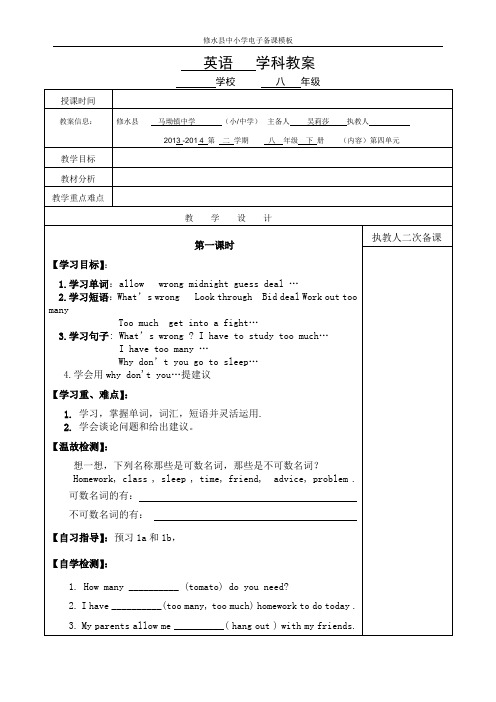
你应该再多等一会儿。
--- I have a very bad cold.我感冒很厉害。
--- You should lie down and have a rest.你应该躺下,多喝水。
【当堂训练】:
一.单选:
( )1.How about ____ calendar?
(5), Let’s do sth…?
(6). What should Ido…?( should表示请求、征询对方意见)
e.g.:What should I get my dad for his birthday?
我该送给爸爸什么作为他的生日礼物呢?
【当堂训练】:
一.汉译英:
1.去睡觉________________2.Get into a fight________
Today my speech topic isLearning to get along with our parents.
These days ,most of us feel it hard to get along with our parents.
___________________________________________________________________________________________________________________________________________________________________________________
(1).be afraid of something害怕
Don't be afraid of the dog.别害怕那只狗。
人教版新目标英语八年级下册 第四单元第四课时 教学课件

1. “ After-school classes can help Agree: kids get into a good university.”
2. “I want my child to be a successful person.”
3. “It’s good for children to start learning from a young age.”
cause a lot of stress for children.Kids should have time to relax and think for themselves,too.
Look at the words in bold in the article. Can you guess their meanings? Try to match them with the meanings below.
My advice:_I_a_g_r_e_e__w_it_h__B_,_i_n_m__y_v_i_e_w_,_I_’_d_like _to__ta_l_k_w__it_h__h_e_r_w__h_e_n_b_o_t_h__o_f _u_s_a_r_e_c_a_l_m_.
My friend wants me to go to a party on the weekend, but I want to study for my exams next week. A: Why don’t you just go to the party? It’ll
1. Keeps on happening ___c_o_n_t_in_u_e_____ 2. Physical exercise and practice of skills_t_r_a_i_n_ing 3. Worries about things at home, school or
人教版八年级下册英语教案unit4
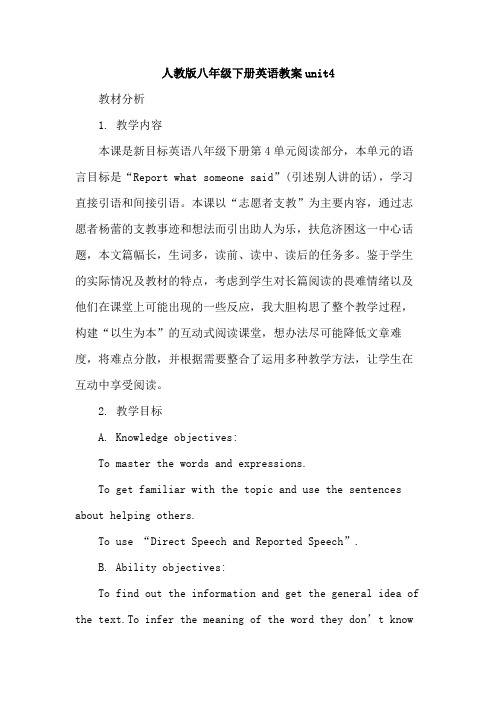
人教版八年级下册英语教案unit4教材分析1. 教学内容本课是新目标英语八年级下册第4单元阅读部分,本单元的语言目标是“Report what someone said”(引述别人讲的话),学习直接引语和间接引语。
本课以“志愿者支教”为主要内容,通过志愿者杨蕾的支教事迹和想法而引出助人为乐,扶危济困这一中心话题,本文篇幅长,生词多,读前、读中、读后的任务多。
鉴于学生的实际情况及教材的特点,考虑到学生对长篇阅读的畏难情绪以及他们在课堂上可能出现的一些反应,我大胆构思了整个教学过程,构建“以生为本”的互动式阅读课堂,想办法尽可能降低文章难度,将难点分散,并根据需要整合了运用多种教学方法,让学生在互动中享受阅读。
2. 教学目标A. Knowledge objectives:To master the words and expressions.To get familiar with the topic and use the sentences about helping others.To use “Direct Speech and Reported Speech”.B. Ability objectives:To find out the information and get the general idea of th e text.To infer the meaning of the word they don’t knowfrom the context.C. Affective objectives:Students are to realize the importance of helping others and they are encouraged to help others.Students’ team spirit will be improved by completing a certain task together.By understanding the life in rural areas, students are to realize how happy they are.3. 教学策略:(1)兴趣激发策略。
人教新目标八年级英语下册Unit4Whydon'tyoutalktoyourparents说课稿

人教新目标八年级英语下册Unit 4 Why don’t you talk to your parents说课稿一. 教材分析人教新目标八年级英语下册Unit 4 Why don’t you talk to your parents是一篇关于日常交流和沟通的文章。
本篇文章主要讲述了在遇到问题时,如何与父母沟通,寻求解决方案。
通过本节课的学习,学生能够掌握情态动词why not的用法,以及如何运用交际策略进行日常交流。
教材内容贴近学生生活,有利于激发学生的学习兴趣和积极性。
二. 学情分析八年级的学生已经掌握了基本的英语语法和词汇,具备一定的听说读写能力。
但在实际交流中,学生往往因为害羞、紧张等原因不敢开口说英语,本题正好可以引导学生学会如何与父母沟通,提高他们的交际能力。
同时,学生在这个年龄段开始关注家庭和社交问题,对本节课的内容会产生浓厚兴趣。
三. 说教学目标1.知识目标:学生能够掌握情态动词why not的用法,了解日常交际中的沟通策略。
2.能力目标:学生能够运用所学知识进行日常交流,提高口语表达能力。
3.情感目标:学生学会与父母沟通,增进家庭关系,培养良好的交际习惯。
四. 说教学重难点1.重点:情态动词why not的用法和日常交际策略。
2.难点:如何运用所学知识进行实际交流,克服羞涩、紧张等心理障碍。
五. 说教学方法与手段1.情景教学法:通过设定情景,让学生在实际语境中学习英语,提高交际能力。
2.任务型教学法:学生分组完成任务,激发学习兴趣,培养合作精神。
3.互动式教学法:教师与学生互动,引导学生积极参与课堂讨论,提高口语表达能力。
六. 说教学过程1.导入:用一段关于家庭沟通的短片引出本节课的主题,激发学生的学习兴趣。
2.新课呈现:教师展示文章,引导学生关注文章标题和关键词,预测文章内容。
3.课堂讲解:教师讲解情态动词why not的用法和日常交际策略,让学生通过例句理解并掌握。
4.实践环节:学生分组进行角色扮演,运用所学知识进行实际交流,教师巡回指导。
初中英语_八下Unit 4 Section A Period 2教学设计学情分析教材分析课后反思
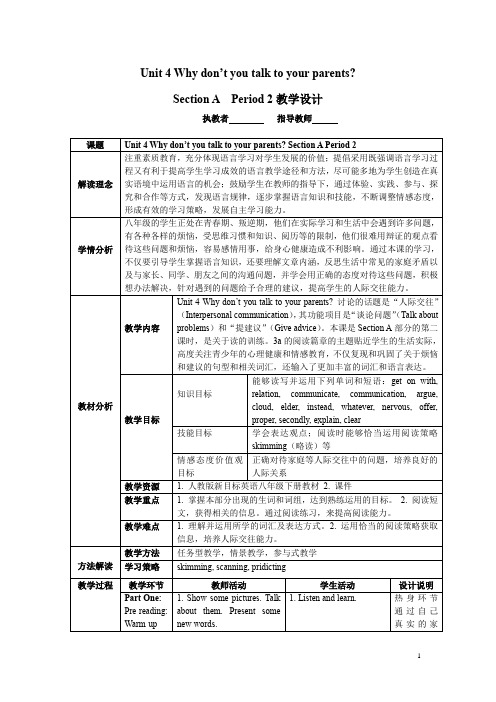
Unit 4 Why don’t you talk to your parents?Section A Period 2教学设计执教者指导教师学情分析从生理学和心理学的角度分析,八年级的学生正处在青春期、叛逆期,他们在实际学习和生活中会遇到许多问题,有各种各样的烦恼,受思维习惯和知识、阅历等的限制,他们很难用辩证的观点看待这些问题和烦恼,容易感情用事,给身心健康造成不利影响。
通过本课的学习,不仅要引导学生掌握语言知识,还要理解文章内涵,反思生活中常见的家庭矛盾以及与家长、同学、朋友之间的沟通问题,并学会用正确的态度对待这些问题,并积极想办法解决,而不是消极地逃避问题,针对遇到的问题给予合理的建议,使学生形成乐观、宽容、大度、慷慨的个性,促进学生的身心健康成长,提高学生的人际交往能力。
从教学的角度分析,要注意将中心话题与学生实际生活密切地联系起来,创设人际关系问题情境,让学生参与其中,激发学生的学习兴趣,培养良好的教学氛围,对学生的听说读写能力进行全方位的训练和提升,让学生将学和用紧密地结合起来,从而提高综合语言运用能力。
效果分析本课是阅读教学,能从教学内容和学生已有知识经验出发,构建“教师启动,学生主动,师生互动”的阅读模式,重视阅读过程, 把阅读分为阅读前、阅读中和阅读后三个阶段,密切联系学生的学习生活实际,通过多种互动形式如Summary,Discussion,Suevey and report 等让学生动起来,为学生体验、参与、实践与合作学习提供了充分的机会,活动的设计从学生实际生活经验出发,层层递进,激发了学生兴趣,调动了学生学习的积极性,发展了学生的综合语言运用能力,使学生积极参与到获取信息和处理信息的过程中,实现了语言学习与语言运用的有机结合。
在传授语言知识,培养语言技能的同时,充分挖掘文本中的思想内涵,有机渗透品德教育,使学生的情感态度价值观实现升华。
由于课文中的生词和短语较多,这给学生的顺利阅读带来了很大困难,尽管在热身环节运用图片等,形象直观地做了解释说明,但在一节课里让学生熟练掌握和运用还是非常不容易的,因此在语言输出环节可能出现学生不会读、不会说、不会用的问题。
八年级英语下册Unit4Whydon’tyoutalktoyourparents第4课时SectionB1a_2e教案新版人教新目标版

Unit 4 Why don’t you talk to your parents课题Section B 1 (1a-2e)课型新授课教学目标1. 语言知识目标:1) 能掌握以下单词:member, pressure, compete, opinion, skill, typical, football, cut out, continue, compare, compare…with, crazy, push, de velopment, cause, usual2) 能掌握以下句型:① I think Wei Ming should…② Although you may be…, you should talk to them.③ Life shouldn’t just be about …④ Why don’t they just let their kids be kids?⑤ Al though it’s normal to want successful children, it’s even more important to ha ve happy children.2. 情感态度价值观目标:了解中国及一些其他国家中学生们普通存在的生活及学习上问题,了解别人的生活现状及他们苦恼,知道学习知识是很重要的事情,但它并不是生活的全部。
重点 1) 掌握本课时出现的生词及用法。
2) 进行听力训练,提高综合听说能力。
3) 阅读短文,获得相关信息,提高学生们的综合阅读能力。
难点1. 听力训练2. 阅读2b部分的短文并完成相关要求。
教学用具多媒体教学环节说明二次备课复习新课导入课程讲授Step 1 Revision1. Daily greeting.2. 复习提建议的表达方式,并完成相关任务。
3. Check the homework. Let some Ss give advice.Step 2 Warming up1. T: Show a picture of student.—What’s wrong with the girl?—She’s too stressed out.—What should she do? Can you give her some advice?2. Ss discuss the problem and give some advices:e.g.S1: Why not hang out with her friends.S2: She could play sports.S3: She could play computer games.S4: She should listen t o music and read some books.Step 3 WritingWork on 1b1. Ask one student read the sentences in 1a. Explain some main sentences.2. What activities do you like to help lower your stress? Orderthem from 1-8 with being the most favorite thing you do to lower stress.3. Ss discuss with their desk mates then order them.4. Let some Ss say their answersStep 4 TalkingLet some Ss talk about their answers.S1: I always hang out with my friends to lower stress.S2: I like to listen to music to lower stress best.Step 5 ListeningWork on 1c:1. Tell Ss to read the sentences 1c first.2. Play the recording for the Ss. Ss just listen for the first time. Play the recording again and check the problems Wei Ming talks about.3. Check the answers:Work on 1d:1. Let Ss read the sentences in 1d first. Tell Ss to listen again and fill in the blanks.2. Play the recording again for the Ss to listen and write.3. Ss listen to the recording carefully and try to write the words in the blan ks.4. Check the answers with the class.Step 6 Pair work1. Work in pairs. Suppose your partner is Wei Ming. You try totell her some advice and say why.2. Let two students make a model for the Ss.3. Ss practice their conversations4. Teacher can walk around the classroom, and give some help to the Ss.Step 7 Thinking1. T: There are some after-school activities. What activities doyou and your classmates usually do? Check them.2. Ss check the activities they usually do.3. Ask some Ss say their choices.Step 8 ReadingWarming upWhat did you do after school?Do you have stress in your life?How do you relax yourself?Fast Reading1. T: Now let’s work on 2b. First, let’s read the questions andmake sure we know the mea nings of all the questions. Thenread the passage quickly and find the answers to thequestions.1) What is the common problem for Chinese and American families?2) Who gives their opinions about the problems?2. Ss read the letter quickly and try to find the answers to the two questions.3. Check the answers wit h the class.Careful Reading1. T: Now let’s read these sentences about the letter. Read thepassage again. Judge if the sentences are True or False.Please underline under the main sentences.1) Chinese children have to take so many after-school classeson weekends these days.2) Cathy Taylor really wants her three children to besuccessful, so she believes these after-school activitiesare important for them.3) Linda Miller thinks parents should send their small kids toall kinds of classes.4) Linda thinks some parents push their kids too much.5) Alice thinks kids shouldn’t have time to relax and think for themselves2. Ss read the letter again and judge the sentences.3. Check the answers with the class.Post readingWork on 2c1. Now look at the words in bold in the article. Can you guesstheir meanings? Try to match them with the meaning below.2. Let Ss read and try to match the words.3. Give Ss some advice on how to do it.4. Check the answers with the Ss.5. Give some explanation about the difficult words.Work on 2d1. Tell Ss to read the passage again and answer these questionsbelow.1) Does Cathy Taylor think it’s important for kids to join afterschool activities?2) Does Linda Miller agree with Cathy? What’s her opinion?3) Does Dr. Green agree with Cathy or Linda? What does she say?2. Ss work by themselves.3. Check the answers toge ther.小结Summary作业布置Homework1. Read the article again after school.2. Write a short passage about Cath y’s daily life and her opinionsabout the education of the kids.板书设计课后反思Unit 10 I’ve had this bike for three years课题Unit 10 I’ve had this bike for three years. 课型新授课Section A1 (1a-2d)教学目标一、知识与技能1.掌握本课单词和短语:search am ong,crayon,shame,regard…as count,century,according to,opposite,especially,memory,consider,hold2. 能从阅读中获得自己周围的事物变化的相关信息。
新目标英语八年级下册Unit4-Why-don't-you-talk-to-your-parents
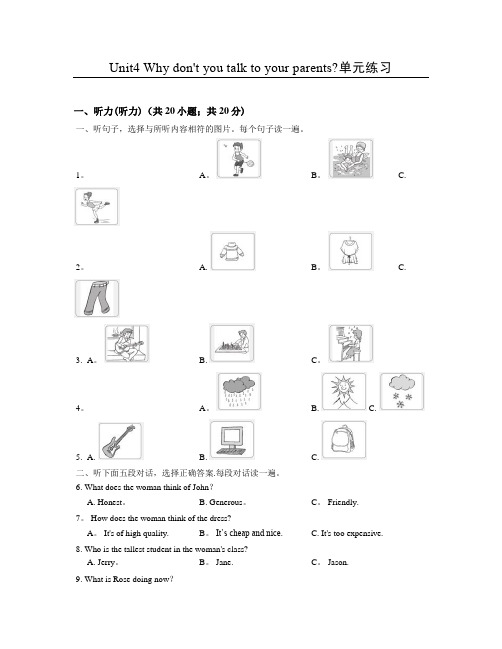
Unit4 Why don't you talk to your parents?单元练习一、听力(听力)(共20小题;共20分)一、听句子,选择与所听内容相符的图片。
每个句子读一遍。
1。
A。
B。
C. 2。
A. B。
C.3. A。
B. C。
4。
A。
B. C.5. A. B. C.二、听下面五段对话,选择正确答案.每段对话读一遍。
6. What does the woman think of John?A. Honest。
B. Generous。
C。
Friendly.7。
How does the woman think of the dress?A。
It's of high quality. B。
It’s cheap and nice. C. It's too expensive.8. Who is the tallest student in the woman's class?A. Jerry。
B。
Jane. C。
Jason.9. What is Rose doing now?A. Playing with her sisters.B. Watching a movie.C。
Doing her homework.10. Why is the woman asking for more hot water?A。
She is thirsty. B。
She hurt her feet. C。
It’s cold today.三、听下面两段对话,选择正确答案。
每段对话读两遍。
听第11段对话,回答第11至第12题。
11. What’s the matter with Lucy?A。
She speaks too much。
B。
She has a sore throat。
C. She drinks too much water.12. What should not Lucy have to do?A. Not to speak too much。
人教版八年级英语下册集体备课教案:Unit4 Why don’t you talk to your

课题课时Period 1教学目标语言技能听:能听懂他人他人陈述困难和麻烦的简单对话的内容,并获取主要信息。
说:1.能询问、陈述自己或他人的困难和麻烦,如What’s wrong?I’m really tired because I studied until midnight last night.2.能针对别人的困境提出解决的办法和建议,如What should Ido?Well,you should call him so that you can say you’re sorry.语言知识语音:熟练把握邀请句的升调语调,同时,在口语交流时能做到语音、语调准确、自然、流畅。
词汇:1.熟练运用:allow,wrong,midnight,guess,de al.2.掌握:What’s wrong, look through,work out.语法:1.能正确使用情态动词could,should表达或劝告,如:Youcould go to his house.2.能正确使用Why don’t you...?句型表达建议。
功能:学会询问、陈述自己或他人的困难和麻烦。
话题:了解人际交往的相关知识。
情感态度1.培养学生用英语交际能力,学会与人进行流畅的沟通和交流;2.使学生在活动中学会真诚、坦然地与人交谈。
学习策略认知策略:能在具体的情境中询问、陈述自己或他人的困难和麻烦,从而进一步主动练习和实践。
调控策略:.能针对别人的困境提出解决的办法和建议,并与人进行交流。
交际策略:培养学生合作能力,不断完善知识点,加强对话练习,学会与人闲聊,进行交流。
资源策略:通过多媒体、录音机等教学辅助工具。
文化意识了解中西方家长对待孩子参加课外活动和课外学习班的态度与做法。
教学重难点教学重点1.能正确使用情态动词could,should表达或劝告。
2.能正确使用Why don’t you...?句型表达建议。
教学难点1.Talk about problems.2.Give advice.教学方法听说法,交际法,教学辅助手段PPT, recorder.板书设计Unit4 Why don’t you talk to your parents?Sectio n A 1a-2dallow What’s wrong?wrong Why don’t you...?midnightguessdeal教后反思本节课学会了提建议的方式有:Why don’t you...? /Why not…?等Teaching ProcedureStages/TimingStep 1. warming-upStep 2 PresentationStep3 DiscussionStep 4Pre sentationStep 5 ListeningTeach ers’ a ctivitiesAfter greeting, ask students :What day is it today?What’s the date today?What’s the weather like today?1. Show the picture of a girl:T: Please look at this girl,what isshe doing?T: Look at her face,she isworried.because she has a lotof homework to do.Do yo uhave too much homework todo?Do you think it is serious?1a.Get them to read the followingsentences and discuss wheatherthey are serious or not. And thenwrite them in the approprite boxT:Do you have theseproblems?What kind of problemsdo you have?Students’ activitiesStudents answer the questions。
人教新目标八年级英语下册素材:Unit 4 教材分析
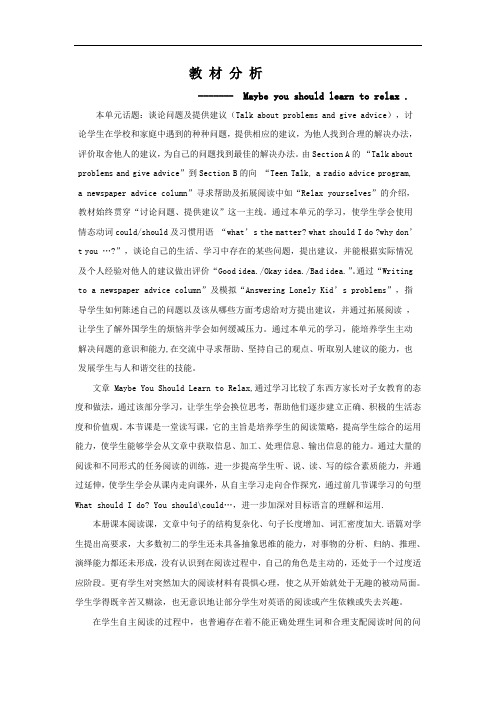
教材分析------- Maybe you should learn to relax .本单元话题:谈论问题及提供建议(Talk about problems and give advice),讨论学生在学校和家庭中遇到的种种问题,提供相应的建议,为他人找到合理的解决办法,评价取舍他人的建议,为自己的问题找到最佳的解决办法。
由Section A的“Talk about problems and give advice”到Section B的向“Teen Talk, a radio advice program, a newspaper advice column”寻求帮助及拓展阅读中如“Relax yourselves”的介绍,教材始终贯穿“讨论问题、提供建议”这一主线。
通过本单元的学习,使学生学会使用情态动词could/should及习惯用语“what’s the matter? what should I do ?why don’t you …?”,谈论自己的生活、学习中存在的某些问题,提出建议,并能根据实际情况及个人经验对他人的建议做出评价“Good idea./Okay idea./Bad idea.”。
通过“Writing to a newspaper advice column”及模拟“Answering Lonely Kid’s problems”,指导学生如何陈述自己的问题以及该从哪些方面考虑给对方提出建议,并通过拓展阅读,让学生了解外国学生的烦恼并学会如何缓减压力。
通过本单元的学习,能培养学生主动解决问题的意识和能力,在交流中寻求帮助、坚持自己的观点、听取别人建议的能力,也发展学生与人和谐交往的技能。
文章Maybe You Should Learn to Relax,通过学习比较了东西方家长对子女教育的态度和做法,通过该部分学习,让学生学会换位思考,帮助他们逐步建立正确、积极的生活态度和价值观。
人教新目标英语八年级下册unit4单元知识讲解

2020年春人教新目标英语八年级下册Unit 4 Why don’t you talk to your parents? 话题:讨论问题,给予建议教学目标:○1能够掌握提出建议以及回答建议的表达方式重点:○1提建议以及回答建议的表达方式○2until, so that,although用法重点句型:What’s wrong? 怎么了?Why don’t you…? =Why not…? 为什么不……呢?知识点:1.提建议的表达○1why don’t…?/Why not…?后面接动词原形Why don’t you have a picnic with us?=Why not have a picnic with us?你为什么不和我们去野餐呢?○2how about/what about+doing sth○3You’d better do sth. 你最好做某事○4Let’s …shall we? Let’s 后面接动词原形,意为“咱们……,好吗?”○5shall we/I…?Shall we go boating?○6Would you like…?后接动名词或动词不定式,意为“你们/你想要……吗?”Would you like a cup of coffee?○7Would you please…? 后面接动词原形,意为“请你……好吗?回答对方的建议时,一般用:Good idea./ That’s a good idea.OK./All right.Yes, please. /I’d love to.No problem.I agree with you.Sure./ Of course. /Certainly.Yes, I think so./ I will.表示拒绝时,一般用:I don’t think so./ Sorry, I can’t. /Sorry, but…I’d love to/ like to, but…/I’m afraid…2.until○1作介词“直到……为止”The meeting may last until Friday.○2作连词,直到……为止,在……以前,不到……a.用于肯定句中Heat can be conducted from a hot body to a cooler one until both are at the same temperature.热量可以从一个热的物体传到一个较冷的物体,直到两者温度相同为止。
人教新目标八年级英语下册Unit4-Why-don't-you-talk-to-your-paren
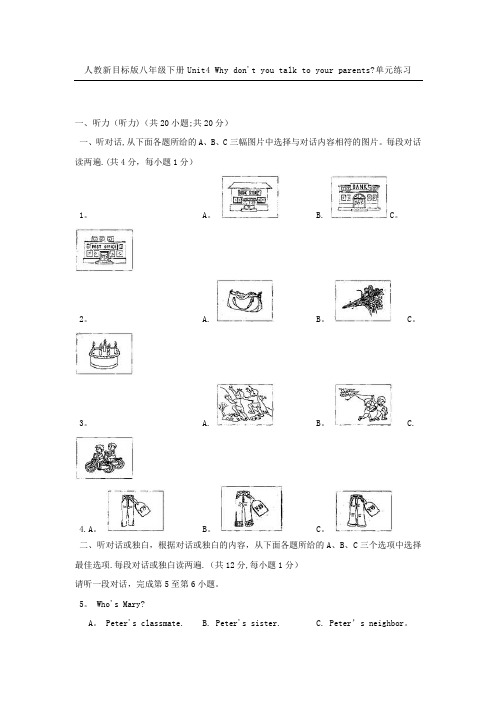
人教新目标版八年级下册Unit4 Why don't you talk to your parents?单元练习一、听力(听力)(共20小题;共20分)一、听对话,从下面各题所给的A、B、C三幅图片中选择与对话内容相符的图片。
每段对话读两遍.(共4分,每小题1分)1。
A。
B. C。
2。
A. B。
C。
3。
A. B。
C.4. A。
B。
C。
二、听对话或独白,根据对话或独白的内容,从下面各题所给的A、B、C三个选项中选择最佳选项.每段对话或独白读两遍.(共12分,每小题1分)请听一段对话,完成第5至第6小题。
5。
Who's Mary?A。
Peter's classmate. B. Peter's sister. C. Peter’s neighbor。
6. What does Mary’s brothe r teach?A. Japanese。
B. English. C。
Chinese。
请听一段对话,完成第7至第8小题。
7。
Where does the boy want to go?A. The museum.B. The cinema.C. The shop.8. What time will the boy meet his friends?A。
At 7:30。
B。
At 5:30. C。
At 3:30。
请听一段对话,完成第9至第10小题。
9. Why does the boy look unhappy?A。
He has to write a paper。
B. He has to take a history class.C。
He has to repair his computer.10。
What's the most important invention for the girl?A。
Clocks。
B。
Computers. C。
人教新目标八年级英语下册人教版八下英语Unit_4Why_don't_you_talk_to_your_parents

What’s wrong with Peter?
Listen. Peter’s friend is giving him 2a advice. Fill in the blanks with could or should.
Advice 1. You _______ could write him a letter. ( ) 2. You _______ ) should call him up. ( should talk to him so that you can say you’re 3. You _______ sorry. ( ) could go to his house. ( 4. You _______ ) 5. You _______ ) could take him to the ball game. (
too many afterschool classes too much homework
Learning aims
• 1. Master the words and phrases: allow (allow sb. to do sth.), wrong (What’s wrong), midnight (until midnight), look through, guess, deal (a big deal), work out • 2. By using “What’s wrong? Why don’t you...”, 讨论问题并给出建议 Eg: A: What’s wrong? B: I’m really tired because I studied until midnight last night. A: Why don’t you go to sleep earlier this evening.
- 1、下载文档前请自行甄别文档内容的完整性,平台不提供额外的编辑、内容补充、找答案等附加服务。
- 2、"仅部分预览"的文档,不可在线预览部分如存在完整性等问题,可反馈申请退款(可完整预览的文档不适用该条件!)。
- 3、如文档侵犯您的权益,请联系客服反馈,我们会尽快为您处理(人工客服工作时间:9:00-18:30)。
Unit 4学案一. 重点单词1. ever adv.曾经;永远2. message n.消息;信息3. suppose v.假定;认为;期望4. nervous adj.神经紧张的;不安的5. true adj.真实的6. lucky adj.幸运的7. copy v.复制;抄袭8. own adj.自己的9. village n.乡村10. area n.地区;地域的11. meter n.米;公尺12. thin adj.稀薄的13. decision n.决心;决定14. husband n. 丈夫15. college n.学院;大学16. start n.开始;开端17. influence n.影响18. hometown n.家乡,故乡19. danger n.危险二. 重点词组1. have a surprise party开一个惊喜聚会2. be mad at对……非常愤怒,恼火3. first of all首先4. pass....to把……传给……5. be supposed to认为必须,认为应该6. do well in在某方面做得好;擅长7. have a cold感冒8. be in good health身体健康9. get nervous变得紧张10. end-of-year exam年终考试11. report card成绩报告单12. get over恢复;克服13. pass on传递三. 重点句子1. I am mad at Marcia. She said she was mad at Marcia.2. I am having a party for Lana. She said she was having a party for Lana.3. I go to the beach every Saturday. He said he went to the beach every Saturday.4. I will call you tomorrow. He told me he would call me tomorrow / the next day.5. I can speak three languages. She said she could speak three languages.四. 重点语法: 间接引语直接引语和间接引语:直接引用别人的话表达意思,称为直接引语;用自己的话转述别人的话,称为间接引语。
直接引语间接引语I am mad at Marcia.I am having a party for Lana.I go to the beach every Saturday.I will call you tomorrow.I can speak three languages. She said she was mad at Marcia.She said she was having a party for Lana. He said he went to the beach every Saturday.He told me he would call me tomorrow. She said she could speak three languages.直接引语间接引语一般现在时一般过去时一般将来时过去将来时现在进行时过去进行时直接引语1. am / is2. are3. have / has4. will5. can6. may 间接引语1. was2. were3. had4. would5. could6. might在间接引语中除了注意时态,人称和时间状语的变化外,陈述句的句型,语序没有变化,只是要在陈述句前加连词that,它常常被省略,不在句子中担任成分。
eg. She said to me, “I like English very much.”---- She said ( that ) she liked English very much.当引用的句子是一般疑问句,转述为间接引语时,要把一般疑问句句型转换为陈述句句型,同时在句子前面加上if或whether。
eg. My friend asked me, “Do you like English?”---- My friend asked me if / whether I liked English.当引用的句子是祈使句时,那么间接引语要改用动词不定式表示。
句型:肯定句:tell / ask ...sb. to do sth.否定句:tell / ask ....sb. not to do sth.eg. The teacher said, “Don’t be late again.”--- The teacher told the students not to be late again.把特殊疑问句转述为间接引语时,要特别注意语序的变化。
它的语序转换为陈述句语序,要以疑问词开头(并注意此时不能用that)。
eg. Mary asked me, “Who is she?”----- Mary asked me who she was.五. 知识点讲解1. I’m mad at Marcia.我生玛茜娅的气。
“mad”在此意为“生气的,愤怒的”,be mad at....意思是“生……的气”,“对……发怒”,相当于be angry with。
eg. The teacher was mad at the boy.The teacher was angry with the boy.be mad about意为“对……迷的发狂”eg. I am mad about collecting stamps.get mad意为“变疯,变的恼怒”eg. I got mad yesterday because of his lie.2. Lana said she would bring some drinks and snacks to your house.“bring....to...”表示“(从别处把某人或某物)带来”。
bring的反义词是take,表示把某人或某物“带走(到别处)”。
eg. Please bring the book to school tomorrow.Please take the empty cup away.3. I’m good at speaking.be good at意为“擅长于……”“在……方面做的好”,相当于do well in,后跟名词,动名词,代词。
eg. She is good at singing.=She does well in singing.I’m better at reading than listening.I can do better in math.4. I’m sorry to hear that he had a cold last week. I hope you are in good health.听说他上周感冒了,我很难过,我希望你身体健康。
be sorry to do sth.意为“对……感到很难过”eg. I’m sorry to break the window.I’m sorry to hear of the news.5. I always get nervous.我总是很紧张。
get nervous的用法get nervous“感到紧张不安的;易激动的”get为系动词,nervous为形容词,作表语。
也可以说成:be nervous或feel nervous。
eg. Jenny is a shy girl. She always gets nervous while talking with strangers.I’m nervous about the exams.Take it easy. Don’t be nervous.6. I had a hard time with science this semester, and I wasn’t surprised to find my worst reportcard was from my science teacher.这学期我在自然方面学习很吃力,看到我最差的成绩单是来自我的自然老师时,我一点也不吃惊。
(1)have a hard time with sth意为“在某方面感到很困难”eg. She had a hard time with English Classes.(2)have a hard time with sb.意为“和某人关系处得非常不好”eg. Peter had a hard time with his father.7. I said that was OK and that I was sure she’d get over it.我说那好吧,我确信她会恢复的。
“get over”表“恢复,克服”eg. I am sure you can get over this difficulty.It’s almost done. Lets get it over.六. 写作Telling a story(讲故事)。
